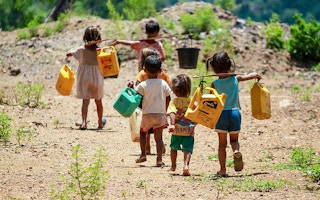Nations must pour up to US$150 billion a year into efforts to deliver safe and clean water for all, or risk an economic crisis due to the healthcare and development impacts of people drinking filthy water.
To continue reading, subscribe to Eco‑Business.
There's something for everyone. We offer a range of subscription plans.
- Access our stories and receive our Insights Weekly newsletter with the free EB Member plan.
- Unlock unlimited access to our content and archive with EB Circle.
- Publish your content with EB Premium.
In order to provide access to safe and affordable sanitation to all by 2030 — which is Goal 6 of the Sustainable Development Goals (SDGs), governments need to quadruple investments into clean water compared to current spending–a goal that calls for engagement with the private sector.
These were the key findings of a World Bank report, titled “Reducing Inequalities in Water Supply, Sanitation, and Hygiene in the Era of the Sustainable Development Goals,” and released on Monday, which highlighted a huge gap in access to clean, piped water between poor and better-off communities in both rural and urban areas.
From the countries surveyed, 75 per cent– or three out of four people– lacked access to improved sanitation and four out of five people are without piped water supply in rural areas, the report said.
The gap in access to safe tap water access also exists in cities. Poor city folks are up to three times less likely to have piped water than those in better-off communities, the report said.
Children pay the highest price
The report also highlighted how unsafe drinking water and poor sanitation expose people, especially children, to risks of diarrhoeal diseases, malnutrition and stunting.
Diarrhoea is the second leading cause of death in children under five globally. Stunted growth is another problem arising from drinking filthy water.
In Ecuador, where 24 per cent of people living in cities drink contaminated water, 21 per cent of children are stunted and 18 per cent are underweight.
“
We are risking the futures of our children: their potential is being stymied by unequal or uneven access to the services they require to thrive.
Rachid Benmessaoud, country director, World Bank Nigeria
Stunted growth also affects more than 40 per cent of children under five in other countries including Guatemala, Niger, Yemen and Bangladesh, said the report.
‘Silent emergency’
With children’s health and well-being compromised by poor access to clean water and adequate sanitation, the World Bank said a ‘silent emergency’ is brewing for these economies.
The children’s undernutrition will have long-term negative effects such as poor mental development, behavioral abnormalities, and a reduced capacity to work, among others.
These disadvantages are detrimental to human capital and to economic development more generally, the report said.
Nigeria country director Rachid Benmessaoud warned of the dire consequences this will have to country’s economy.
“We are risking the futures of our children: their potential is being stymied by unequal or uneven access to the services they require to thrive,” he said.
Nigeria, where over 60 per cent of people in rural communities live more than 30 minutes away from a piped water source, is one of the countries the report identified as having among the lowest investments in water, sanitation and hygiene.
Other countries experiencing severe water issues highlighted by the report included:
- Indonesia, where only 5 per cent of urban wastewater is safely treated and disposed off. Eleven per cent of children living in communities with open defecation practices in the country are also more likely to be stunted.
- Bangladesh, where water running from taps is as filthy as water scooped up from ponds. A high 80 per cent of E. coli – bacteria found in human faeces – was present in the tap water sampled.
- Haiti, where access to improved drinking water sources has declined in the last 25 years; access to improved sanitation is stagnant at 33 per cent; and the number of households with access on premises to improved water has decreased from 15 to 7 per cent.
To address these problems, the World Bank said countries must move fast from having mere water and sanitation policies to implementing these policies with improved efficiency. Investments and innovations must be targeted and coordinated across sectors to improve human development, such as reduced stunting, the bank said.
Guangzhe Chen, senior director for the World Bank’s Water Global Practice, urged governments to immediately close the gap on access to clean water.
“To give everyone an equal chance at reaching their full potential, more resources, targeted to areas of high vulnerability and low access, are needed,” he said.
The report was presented to policymakers and water practitioners at the World Water Week, an annual event organised by the Stockholm International Water Institute (SIWW), which this year was held in Stockholm, Sweden, from August 27 to September 1.










